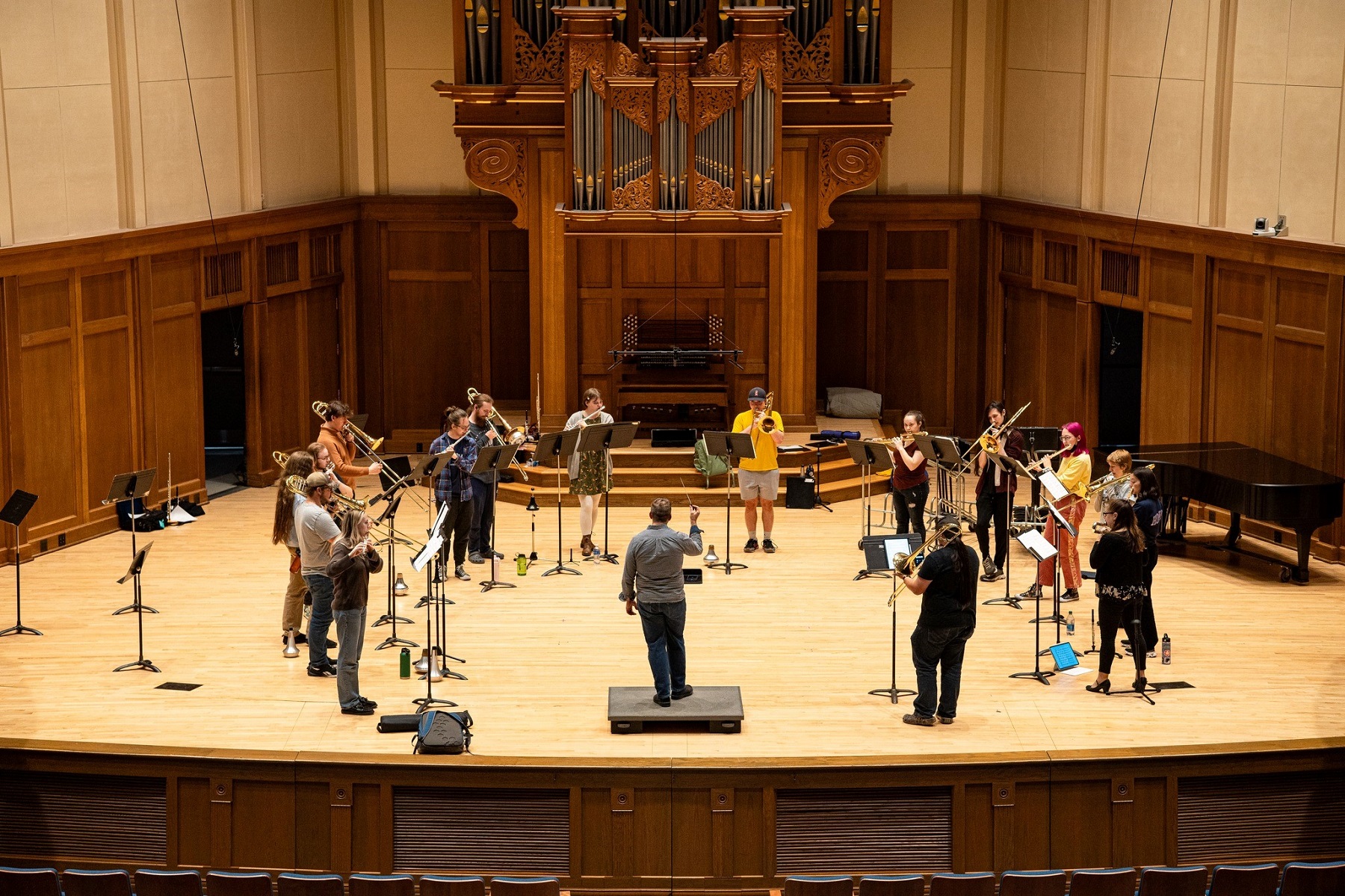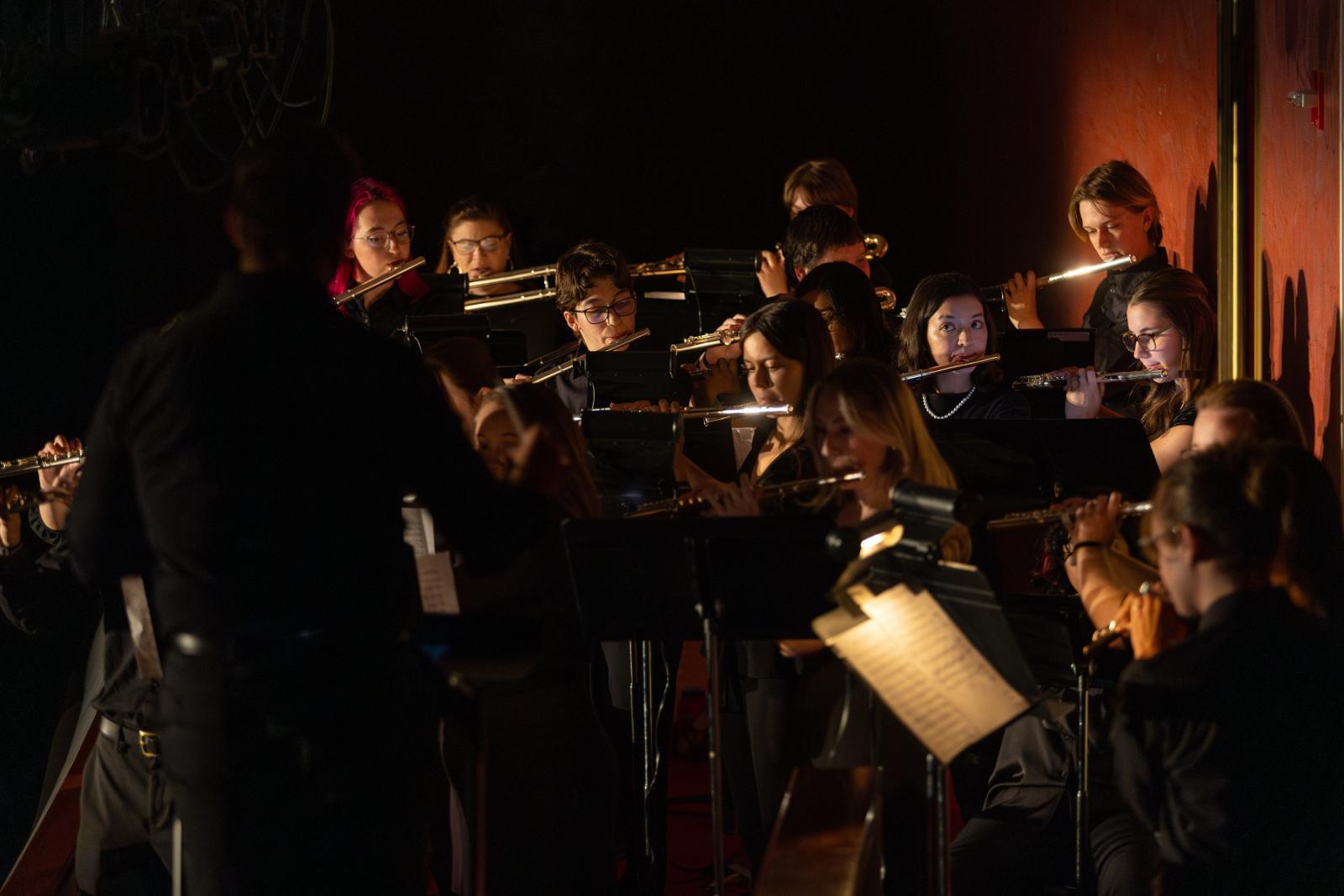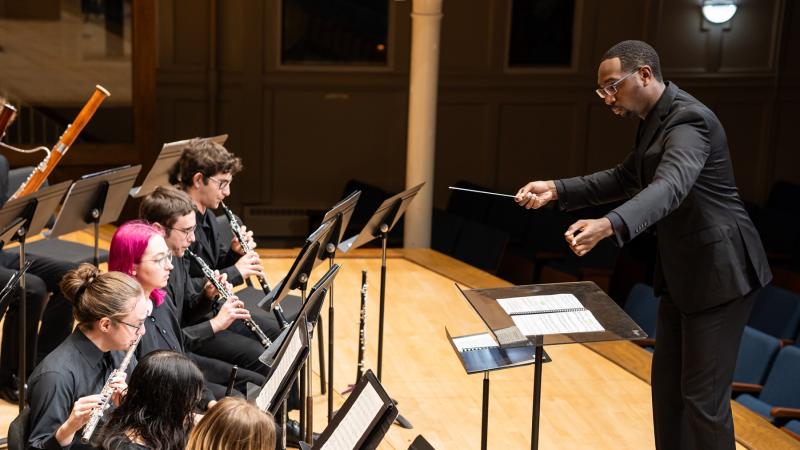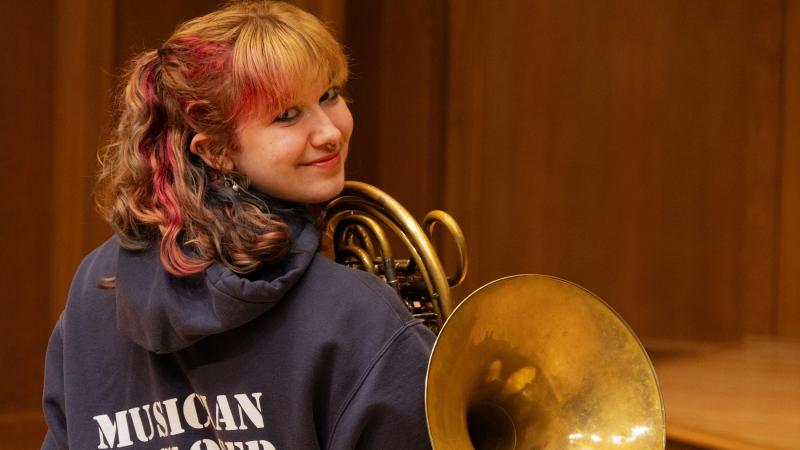Flutes and trombones may be an unusual pairing, but musicians at Lawrence University say otherwise.
The Conservatory of Music’s LU Flute and Trombone Ensembles are joining forces to premiere nine new works, each by a different composer. This ambitious concert, part of the Conservatory's 150th anniversary celebration, is scheduled for 8 p.m. Nov. 1 in Memorial Chapel. It is free and open to the public.
Titled “150th Crescendo: Convergence – New Music Concert,” it will feature three pieces for the flutes, three for the trombones, and three combining both groups.
Guided by three professors—Erin Lesser, professor of music (flute); Michael Clayville, instructor of music in entrepreneurial studies and social engagement; and Tim Albright, associate professor of music (trombone)—the initiative has been a unique journey for all involved.
“Creating something entirely new—without historical reference or standard techniques—pushes us in exhilarating ways,” Lesser said. “This process is a vast and thrilling endeavor for both the students and us as faculty, as it taps into the uncharted possibilities of music-making.”

Flute and trombone students rehearse for the Nov. 1 concert on the stage of Memorial Chapel. (Photo by Ben Frueh '26)
Contemporary classical music often employs extended techniques, pushing young musicians into uncharted territory. While challenging, these approaches offer fresh opportunities for musical exploration.
“We encourage our students to approach this experience as an exploration,” Clayville said. “Each composition is a distinctive sonic landscape, offering both challenges and incredible opportunities for discovery. The chance to interpret these varied worlds is something truly special.”
Albright added: “To bring new music to life requires dialogue, creativity, and flexibility, and it encourages performers to stretch their concepts of what is possible. That’s perfect because these are the same qualities we seek to bring out in our students every day.”
Nearly three dozen students are included: 19 flutists and 15 trombonists, including Lesser, Clayville, and Albright, who will rotate as conductors. Joining them on flute is Lawrence’s own sight-singing instructor Bianca C. Pratte ’20.
“For us as artists,” Lesser said, “this concert is a powerful reminder that music is a living, evolving art form. Engaging with composers who are crafting music that resonates with today’s societal reflections and challenges makes this experience all the more meaningful.”
To prepare, both ensembles attended a retreat at Lawrence's Björklunden in Door County, where they performed the set for the first time. Such social bonding is central to the collaboration’s goals.
“Students often find themselves confined within their own instrumental circles—trombone players with other trombones, percussionists with percussion,” Clayville explained. “This collaboration is a fantastic opportunity to break down those barriers and build connections across different musical worlds.”
The project originated within the Lawrence ecosystem. Isaac Mayhew ’17 approached Albright on behalf of the Millennium Composers Initiative (MCI), a group that “strives to push the limits of what defines music and art through experimental, conventional, and interdisciplinary means.” Initially, MCI sought to collaborate with the Trombone Ensemble, which Albright and Clayville co-direct. Given that Clayville also directs the Flute Ensemble alongside Lesser, a combined project felt natural.
“We've done collaborations in the past,” said Clayville, “so the Flute Ensemble and Trombone Ensemble have done pieces together.”
Integrate intellectual and musical virtuosity in a supportive, creative community that will empower you to find your musical path.
The MCI collaboration is a distinctive opportunity for both ensembles. While ample repertoire exists for flute and trombone ensembles separately, compositions specifically for their combined forces are scarce. In the past, the ensembles have relied on arrangements, but they are not always particularly idiomatic for the flute-trombone timbres.
Clayville noted that while he appreciates arrangements, which allow musicians to reinterpret existing music, he sees a different kind of value in creating something genuinely innovative and original. From his perspective, new music serves as a cultural direction, reflecting the diversity of expression that exists in our modern world.
The ensembles have turned toward composers to fill this repertoire niche. Dominic Ellis ’17 and current senior Aayush Raheja have been featured in the past. Alongside Mayhew, the program includes nine composers from around the world: David Acevedo, Ali Balighi, Ty Bloomfield, Michael Kahle, Chelsea Majkut, Treya Nash, Helder Oliveira, Sofia Jen Ouyang and Ben Zucker. The featured composers offer an impressive variety in their approaches to new music.
“What I hope,” said Lesser, “is that this concert has something for everyone—both players and audience. There is a more traditional flute piece called Fireflies, and that's fun to play. [Other times] we're speaking into our flutes and playing quarter tones.”
One composer took inspiration from animal sounds, creating movements that evoke birds and frogs. To bring the frog sounds to life, she sent the ensembles a box of marbles along with a tutorial on how they can use them to mimic the sounds of frogs.
“I think allowing students to spend time with this music will give them some insights into what is possible out there and maybe open up a new space for them,” Clayville said.



